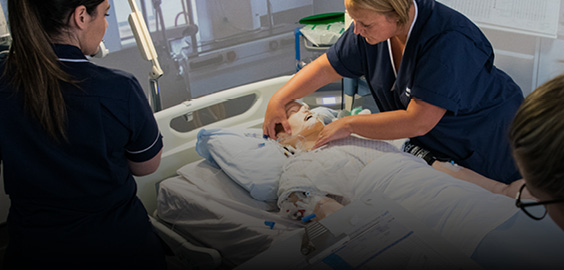The Community Specialist Practice Qualification (SPQ) Higher Apprenticeship programme is designed to equip Postgraduates with the skills
required for Community Specialist Practice.
The Higher Apprenticeship programme
is available full time (54 weeks) or part time (106 weeks).
Four pathways are
available:
- District Nursing (DN)
- General Practice Nursing (GPN)
- Adult Social
Care Nursing (ASCN)
- Community Children’s Nursing (CCN).
Each pathway has a
distinct approach to its delivery; however, all share a more practice focused
delivery, with a 60/40 split between clinical practice and protected learning
time at Northumbria University respectively. This will allow achievement of
your 20% minimum Off The Job (OTJ) hours in line with apprenticeship standards.
This ensures that the specialist field of practice focuses on the specialist
skills required for the pathway. This is evident in the optional modules and as
pathway-focused learning and teaching across all modules.
Apprentices also
benefitting from integrated learning with fellow community specialist
practitioner apprentices. This higher apprenticeship programme has been
innovatively designed and coproduced with a vast range of stakeholders from all
pathway routes in both health and social care, in order to truly reflect
contemporary specialist practice need and service provision requirements. The
apprentice journey has been a focal point of the higher apprenticeship
programmes development, working with past and current SPQ apprentices to ensure
an apprentice-centric philosophy underpinning the higher apprenticeship
programme outcomes.
Full Time and Part Time Overview:
This higher
apprenticeship programme is delivered both part time and full time. The full
time 54-week programme (plus 7 weeks incorporated annual leave entitlement) and
the 106-week (2 year with 14 weeks annual leave incorporated) part time
programme will provide opportunities to develop your understanding of Community
Specialist Practice and capitalise on opportunities for applied learning
contextually relevant to your area of specialist practice. Both full-time and
part-time routes will have a 60/40 split between clinical practice and
protected University theoretical learning and study time respectively. This
will allow achievement of your 20% minimum Off The Job (OTJ) hours in line with
apprenticeship standards.
Within your area of specialist practice (DN, GPN,
ASCN or CCN), the higher apprenticeship programme adopts a distinctive
work-based and teaching philosophy which places emphasis upon a balance of
knowledge and skills development designed to deliver a tangible business or
individual apprentice benefit. This will ensure as a specialist practitioner,
you are suitably qualified to the standards required by the NMC (2022)3 for specialist
practitioners in the community within your specific field of practice.
Pathways:
Higher Apprenticeship- Postgraduate Diploma in
Community Specialist Practice – District Nursing
The Specialist Practitioner Qualification -
District Nursing is critical to effective team leadership and caseload
management. District nurses are advanced autonomous practitioners who deliver
and manage complex healthcare within the home based on need, and across a wide
range of illnesses. They use management and risk skills to adapt to changing
situations, case load management and care coordination, providing education to
staff, patients and carers. District nurses prevent ill health and promote
wellbeing through the recognition of population and public health demonstrating
awareness and understanding of epigenetics and genomics, reducing hospital
admissions, and improving quality of life, communicating across the health care
system to enable people to be cared for in their place of choice. The
Specialist Practice Qualification - District Nursing ultimately prepares
postgraduate nurses to practise autonomously in the community, deliver holistic
care, manage complex caseloads, prevent unnecessary hospital admissions, and
promote patient comfort and safety.
Higher Apprenticeship- Postgraduate Diploma in
Community Specialist Practice - Childrens Community Nursing
Community Children’s Nurses (CCN) are autonomous
practitioners working collaboratively with infants, children, young people, and
their families/carers ensuring health needs are supported and met in a variety
of community settings. They deliver high quality and complex health care for
those with acute/long term conditions, disabilities and complex conditions,
life-limiting and life-threatening illness including those requiring palliative
and end of life care. The CCN role is highly complex, always evolving and
requires skills in negotiating, coaching, teaching, innovation, assessing risk
and shared decision making in areas of complex clinical care that may have
limited evidence base. The Specialist Practice Qualification will provide an
excellent postgraduate higher apprenticeship programme ensuring the CCN
workforce is enabled to develop the advanced level knowledge, skills, and
experience for working in the community.
Higher Apprenticeship- Postgraduate Diploma in
Community Specialist Practice - General Practice Nursing
A Specialist Practice Qualification General
Practice Nursing (GPN) prepares the GPN to work autonomously addressing the
complexities in prevention of ill health and promotion of wellbeing. In
addition to a wide range of clinical skills sets, they are instrumental in
managing individual and population health. They require skills in negotiation,
coaching, teaching collaboration with other agencies and services in supporting
people and their carers to enable them to live safely and confidently at home,
managing their own conditions wherever possible. The Specialist Practice
Qualification also prepares the GPN to adapt and manage a range of models of
care provision and lead future GPN education and training in practice.
Higher Apprenticeship- Postgraduate Diploma in
Community Specialist Practice - Adult Social Care Nursing
Within adult social care
settings (care homes, independent care provision, and care closer to home),
nurses are normally the lead clinician, carrying a significant burden of
responsibility for both clinical and holistic care of individuals, and
leadership and management for adherence to organisational legislation and
policy. A Specialist Practice Qualification Adult Social Care nursing will
benefit nurses in these roles by providing specialist knowledge, skills, and
attributes. These will be valued and provide assurance of expertise and
provision of high-level complex care for residents and families and
owners/operators of nursing and residential homes of all sizes.
You can view our Community Specialist Practitioner Postgraduate Diploma Programmes here:

 Option for Placement Year
Option for Placement Year Option for Study Abroad
Option for Study Abroad












